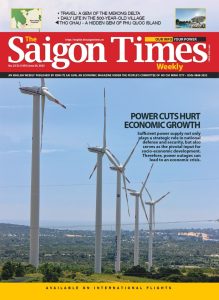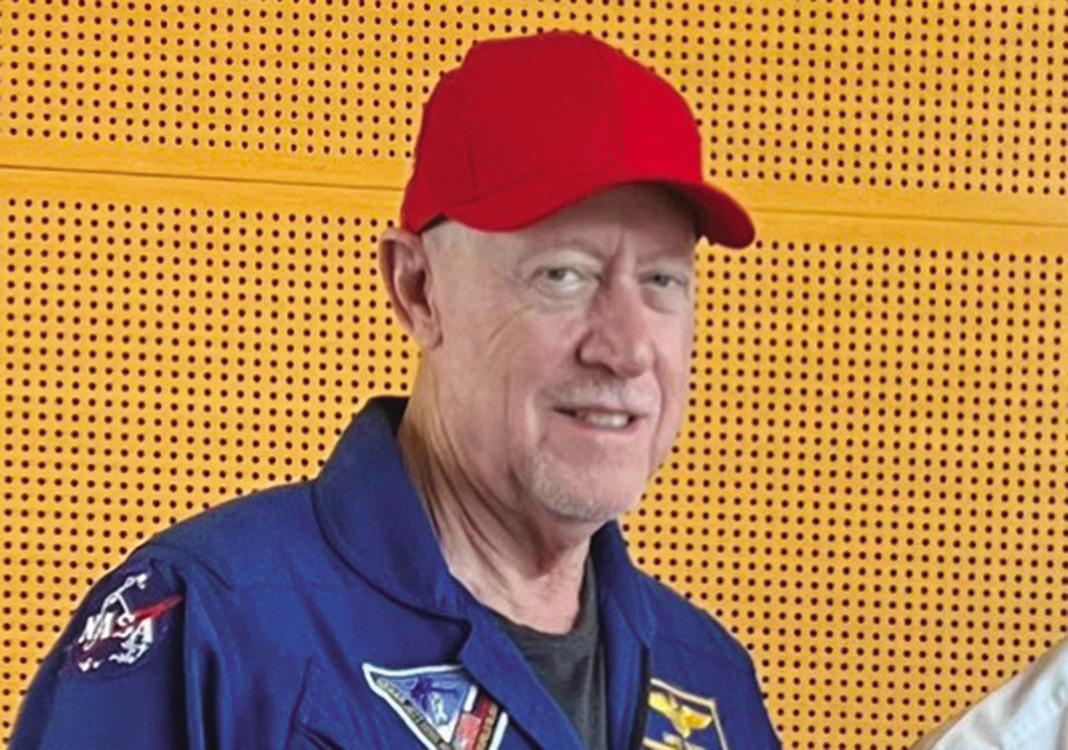Michael A. Baker, a veteran astronaut of the National Aeronautics and Space Administration (NASA), has just participated in the VIETNAM SPACE WEEK early this month as a highly decorated speaker. He speaks with The Saigon Times in a conversation after a week-long event that wrapped up in Binh Dinh Province about the value of education in general and science in particular in life.
The Saigon Times: We are greatly honored to have an interview with you as a highly esteemed astronaut of NASA on the occasion of your participation in the VIETNAM SPACE WEEK. What key points do you bring to the event, your rich experiences as a veteran astronaut, as a pilot and as an engineer?
Michael A. Baker: I believe the most precious and important thing we have is our children. They are our future, not only of our families, but of our cities, countries and indeed our beautiful planet. I think it is vitally important to encourage and promote an education and career in Science, Technology, Engineering, Art, and Math (STEAM). I hope my story of how I became a Naval Aviator, Test Pilot and Astronaut and sharing my experiences as an astronaut will inspire our children to take an interest in a STEAM education and career as well as encourage lifelong learning.
The space science in the United States is widely admired worldwide for its landmark, tremendous achievements that have brought about profound changes for the humankind, but such achievements – I would assume – have been made possible due to the great commitment from authorities stateside, wholehearted devotion by scientists as well as the immense investment by the world’s biggest economic power. For a developing country like Vietnam, do you think there is still a viable pathway to take to and pursue the space science, and how?
 I think it is very important, beneficial and certainly within the realm of possibility for a developing country like Vietnam to pursue a healthy and vibrant space program and industry. I think programs like Vietnam Space Week are a great place to start. It raises the awareness of space activities in the general public, academia and government, and sparks the imagination to investigate the many possibilities associated with a strong well-funded space agency and space science community.
I think it is very important, beneficial and certainly within the realm of possibility for a developing country like Vietnam to pursue a healthy and vibrant space program and industry. I think programs like Vietnam Space Week are a great place to start. It raises the awareness of space activities in the general public, academia and government, and sparks the imagination to investigate the many possibilities associated with a strong well-funded space agency and space science community.
It is recognized that a robust space exploration program needs to be an international endeavor. There is no doubt that Vietnam could contribute to the international partnership that is currently engaged in returning people to the moon, establishing a permanent outpost there and then continuing on to Mars.
Science has ensured ceaseless development and prosperity for the United States, but it seems young people nowadays, especially in developing countries, for the most part, follow routine business trails to get rich quickly instead of pursuing original sciences that do not pay off in the near term. From your own perspective, are there persuasive ways to inspire young people to devote themselves to science without thinking they are “crying for the moon”?
I think this is an issue and problem not only for developing countries, but for all countries today. This is exactly why it is vitally important to promote education in general and STEAM education specifically. For a country to grow and prosper it must have robust science, technology and engineering programs and industries. Using human spaceflight programs as a backdrop provides an easy and effective way to inspire young people to dream big and to make them aware of the multitude of science and engineering disciplines that are available to pursue.
It is said that a culture of scientific spirit needs to be nurtured to ensure a country’s long-term prosperity. How to stir up that spirit among young people?
Everyone is a beneficiary of a strong and healthy culture of scientific spirit. It is important to promote and support a STEAM education at all levels, starting with family members and extending to teachers, business leaders, scientists and government programs.
You had had over 5,400 hours flying time in some 50 different types of airplanes before becoming an astronaut with nearly 1,000 hours in four space missions aboard different spaceships. Is the aeronautical experience a prerequisite for the young to brace for astronautics?
No, aviation was my passion, but there are many fields and skills that are needed in the astronaut program. It is important to encourage young people to pursue an education and career in something they are passionate about. There are so many interesting fields of study that would be suitable for the human spaceflight program. They include physics, geology, planetary science, meteorology, oceanography, biology, medicine, aerospace engineering, mechanical engineering, bio-medical engineering, civil engineering, electrical engineering, computer science and many others.
During your four space missions, numerous studies and experiments had been conducted, covering highly-practical topics, including existential issues for the humans like global environmental change, the contributions of ecology, hydrology, geology, and oceanography to changes in our planet’s environment, life science, etc. What topics do you think will be of greater importance to humankind in the years or decades ahead? And how should young people be prepared for such topics?
All of those topics will continue to be of great importance to humanity and to our survival as a species on this beautiful planet we like to call Spaceship Earth. We are all crewmembers, not passengers, of Spaceship Earth. I think it is worth reiterating that it is important to encourage young people to pursue an education and career in something they are passionate about with an aim to improve life on earth.
What is the key message you will present to young people in Vietnam?
Always reach for the stars and follow your dreams! Anything is possible.
Work hard and study hard!
Stay Curious!
Thank you ever so much for your answers.
Reported by Van Thang









